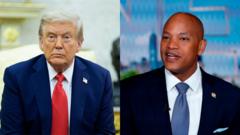In a stark escalation of tensions between President Donald Trump and Maryland Governor Wes Moore, Trump threatened to send troops to Baltimore following Moore’s invitation for the president to join a "safety walk" in the city. Trump's declaration on social media claimed that he would respond to Governor Moore’s request for assistance in a manner similar to actions taken in Los Angeles, referencing what he described as a successful military intervention in nearby Washington, DC.
In his remarks, Trump indicated a desire to "quickly clean up the Crime," furthering his controversial push to deploy National Guard troops to Democratic-led cities, which he argues is necessary for a crackdown on rising crime rates. However, this move has been met with widespread backlash from Democratic leaders who see it as an "abuse of power." Governor Moore described Trump’s comments as "so, so tone deaf and so ignorant," asserting that the president's understanding of the city's challenges is superficial at best.
Trump's remarks appear to be a direct response to a recent invitation from Moore that criticized the president’s approach to urban safety. The governor emphasized that effective strategies stem from genuine engagement with communities, something Trump has not experienced.
In addition to Baltimore, Trump has suggested similar deployments in cities such as New York and Chicago, raising concerns among various state leaders and civil rights advocates. Illinois Governor JB Pritzker condemned the threats to send troops to Chicago, calling it an abuse of power, while Democratic House Minority Leader Hakeem Jeffries questioned Trump's legal authority to take such actions in urban areas.
Public sentiment in Washington, DC regarding these military deployments is overwhelmingly negative; a recent poll showed that nearly 80% of residents oppose the involvement of federal officers and the National Guard in local policing. Meanwhile, statistics from the Metropolitan Police Department indicate a significant decrease in violent crimes in DC, further complicating the narrative Trump has put forth regarding a crime crisis that justifies military involvement.
As tensions simmer and political maneuvering continues, many are left questioning the implications of potential troop deployments on community safety, broader law enforcement practices, and the ongoing dialogue about crime in urban America.
In his remarks, Trump indicated a desire to "quickly clean up the Crime," furthering his controversial push to deploy National Guard troops to Democratic-led cities, which he argues is necessary for a crackdown on rising crime rates. However, this move has been met with widespread backlash from Democratic leaders who see it as an "abuse of power." Governor Moore described Trump’s comments as "so, so tone deaf and so ignorant," asserting that the president's understanding of the city's challenges is superficial at best.
Trump's remarks appear to be a direct response to a recent invitation from Moore that criticized the president’s approach to urban safety. The governor emphasized that effective strategies stem from genuine engagement with communities, something Trump has not experienced.
In addition to Baltimore, Trump has suggested similar deployments in cities such as New York and Chicago, raising concerns among various state leaders and civil rights advocates. Illinois Governor JB Pritzker condemned the threats to send troops to Chicago, calling it an abuse of power, while Democratic House Minority Leader Hakeem Jeffries questioned Trump's legal authority to take such actions in urban areas.
Public sentiment in Washington, DC regarding these military deployments is overwhelmingly negative; a recent poll showed that nearly 80% of residents oppose the involvement of federal officers and the National Guard in local policing. Meanwhile, statistics from the Metropolitan Police Department indicate a significant decrease in violent crimes in DC, further complicating the narrative Trump has put forth regarding a crime crisis that justifies military involvement.
As tensions simmer and political maneuvering continues, many are left questioning the implications of potential troop deployments on community safety, broader law enforcement practices, and the ongoing dialogue about crime in urban America.




















